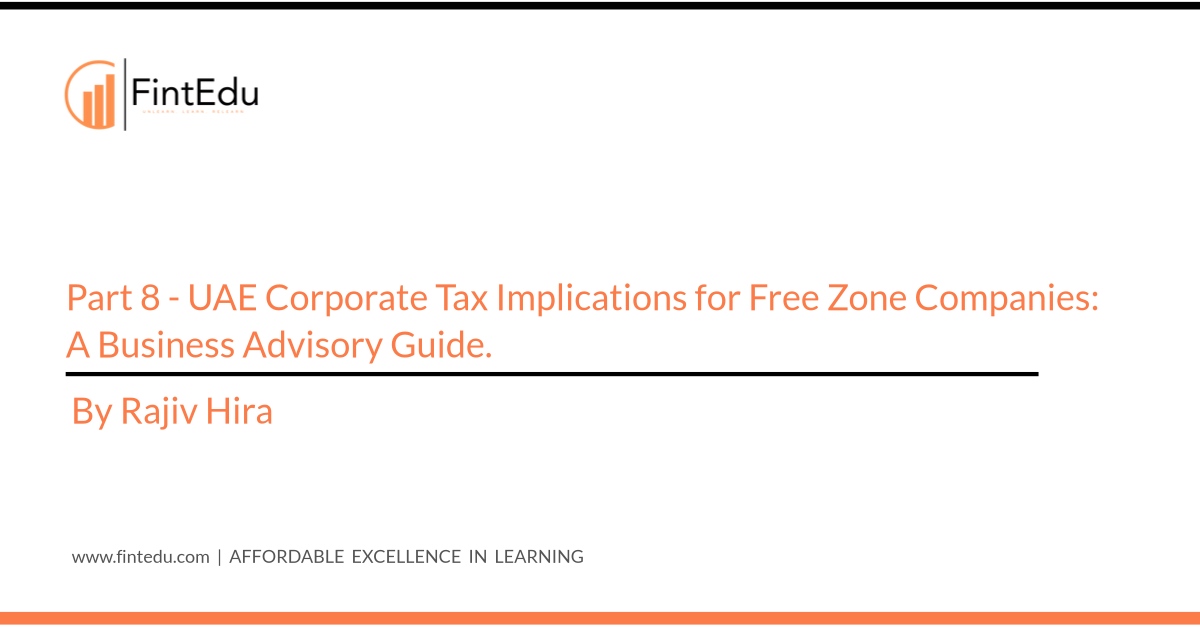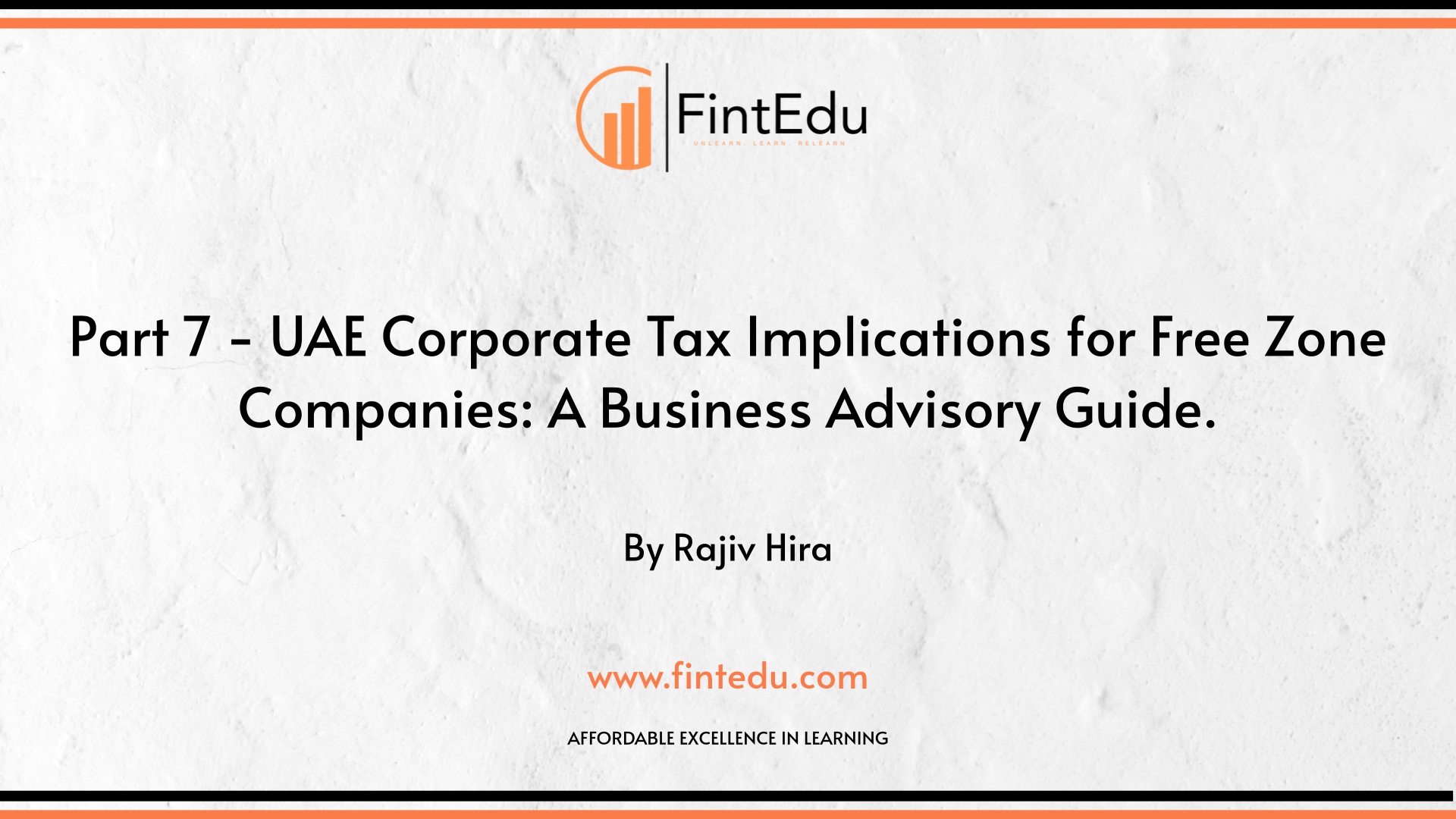LISTEN TO THIS ARTICLE
Finance and Investment Companies (Financial Services, Investment Firms)
Nature of Business: This category includes a range of businesses often found in financial free zones like the Dubai International Financial Centre (DIFC) or Abu Dhabi Global Market (ADGM), as well as in other Free Zones: e.g. asset management companies, wealth management firms, proprietary trading firms, family offices, reinsurance companies, holding investment partnerships, and financing vehicles.
Corporate Tax Nuances: The Corporate Tax regime has carved out several financial activities as Qualifying, while excluding others, reflecting a policy to support certain types of financial services in Free Zones:
Allowed Financial Activities (Qualifying): As listed earlier, :
(a) Fund Management, Wealth and Investment Management, Treasury and Financing Services to related parties, and Reinsurance are Qualifying Activities. Also,
(b) Financing and leasing of aircraft and ownership/operation of ships are qualifying, which often are financial leasing businesses.
(c) Holding of shares and securities for investment (essentially passive investment holding) is also qualifying.
(d) A captive insurance or reinsurance company in a Free Zone can have its underwriting income at 0% (reinsurance is qualifying, general insurance is not).
(e) A group treasury center in a Free Zone making loans to affiliates will have its interest income treated as qualifying (since it’s providing financing to related parties, which is qualifying)
This means, for example, a fund management company in DIFC that earns fee income from managing investment funds can be a QFZP and have that fee income taxed at 0%. A wealth management firm managing portfolios for high-net-worth individuals similarly can benefit (notably, transactions with individual clients for wealth management are explicitly permitted and not “excluded”, recognizing the nature of that business).
Important to note, that the Fund Management and Wealth management, services will be Qualifying Activities if they are subject to the regulatory oversight of the relevant Competent Authority in the UAE (i.e. the Central Bank of the United Arab Emirates, the Dubai Financial Services Authority of the Dubai International Financial Centre, the Financial Services Regulatory Authority of the Abu Dhabi Global Market and the Securities and Commodities Authority as applicable).
- Excluded Financial Activities: Banking is excluded/, so any bank in a Free Zone pays 9%. Also, general insurance (life or non-life primary insurance) is excluded, so insurers in Free Zones don’t get the 0% benefit. Finance & leasing to third parties is excluded except for aircraft financing and ship leasing. This line is a bit nuanced: for example, a car leasing company in a Free Zone leasing vehicles to various customers would likely be considered an excluded activity (finance/leasing), as it’s not limited to related parties or aircraft. Such companies would be taxed at 9% and not qualify for 0%.
- Investment Income: Many Free Zone investment companies (like family offices) derive dividend income, interest, and capital gains from their investments. Under the general Corporate Tax, dividend income (from UAE companies or qualifying foreign shareholdings) and capital gains on sales of shares may be exempt or excluded from taxable income by default for all taxpayers (the UAE law provides a participation exemption for qualifying holdings). But being a QFZP adds another layer: if the business is purely a holding company (which is a qualifying activity), then even non-exempt investment income might fall under 0% by virtue of the entity’s status. For example, a Free Zone company that holds a portfolio of bonds and equities for investment can be QFZP if it meets conditions, and its interest and investment gains (if any) could be at 0%. However, note the holding of securities is supposed to be for investment (12+ months); frequent trading of securities might be considered an active trading business, it’s not listed as qualifying income.
- Regulatory Status vs Tax Status: A company might be licensed for a certain activity in a Free Zone, but its tax treatment depends on the definitions in the decisions. For instance, a DFSA-licensed wealth manager can clearly align with wealth management (qualifying). A DIFC company doing proprietary trading might say it’s an investment business, likely qualifying if considered holding investments. However, a Free Zone bank, even though in a free zone, is out by definition. So large financial institutions like international banks in DIFC / ADGM will simply be taxed normally. Meanwhile, niche financial firms (asset managers, family offices, etc.) can use the 0%.
Related Articles
Part 1 - UAE Corporate Tax Implications for Free Zone Companies: A Business Advisory Guide
Part 2 - UAE Corporate Tax Implications for Free Zone Companies: A Business Advisory GuidePart 3 - UAE Corporate Tax Implications for Free Zone Companies: A Business Advisory Guide
Part 4 - UAE Corporate Tax Implications for Free Zone Companies: A Business Advisory Guide
Part 5 - UAE Corporate Tax Implications for Free Zone Companies: A Business Advisory Guide.
Part 6 - UAE Corporate Tax Implications for Free Zone Companies: A Business Advisory Guide.
Part 8 - UAE Corporate Tax Implications for Free Zone Companies: A Business Advisory Guide.
Part 9 - UAE Corporate Tax Implications for Free Zone Companies: A Business Advisory Guide.
Contributor
Related Posts

@@PLUGINFILE@@/Part%209%20-%20UAE%20Corporate%20Tax%20Implications%20for%20Free%20Zone%20Compa...
Read More
@@PLUGINFILE@@/Part%208%20-%20UAE%20Corporate%20Tax%20Implications%20for%20Free%20Zone%20Compa...
Read More
@@PLUGINFILE@@/As%20we%20approach%2031%20March%202025%2C%20businesses%20with%20a%20VAT%20year%...
Read More